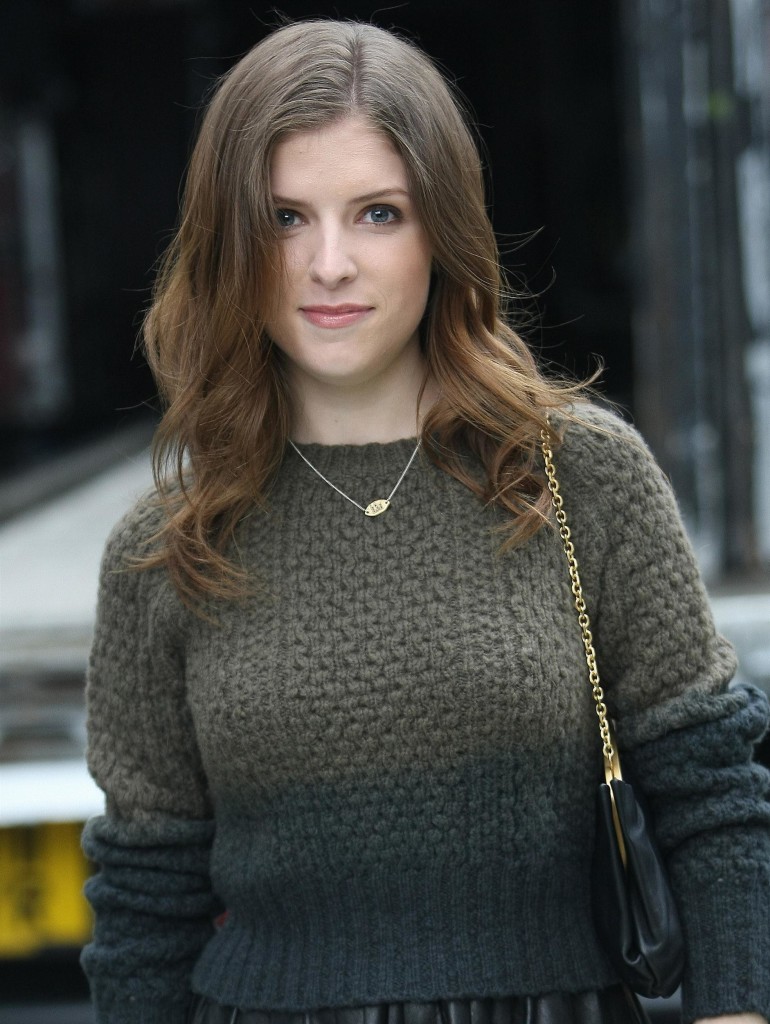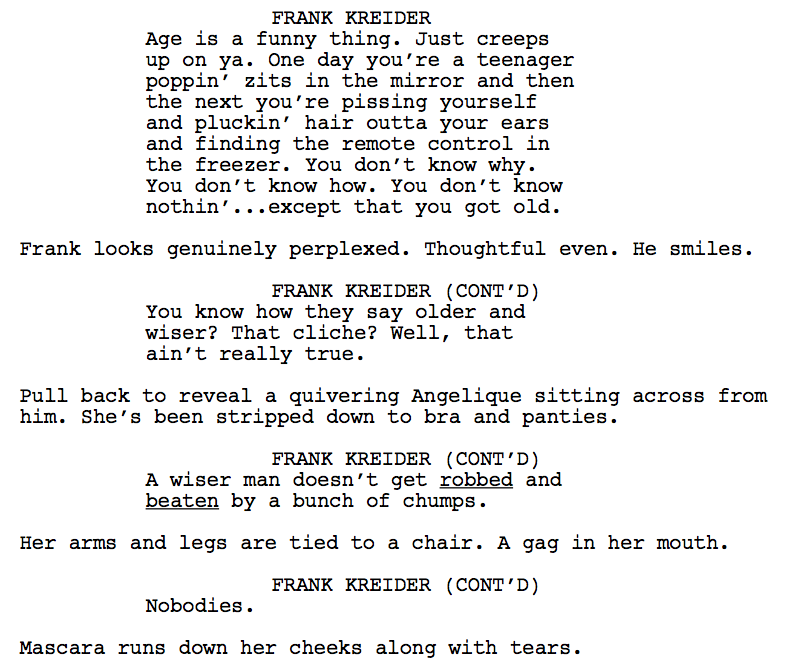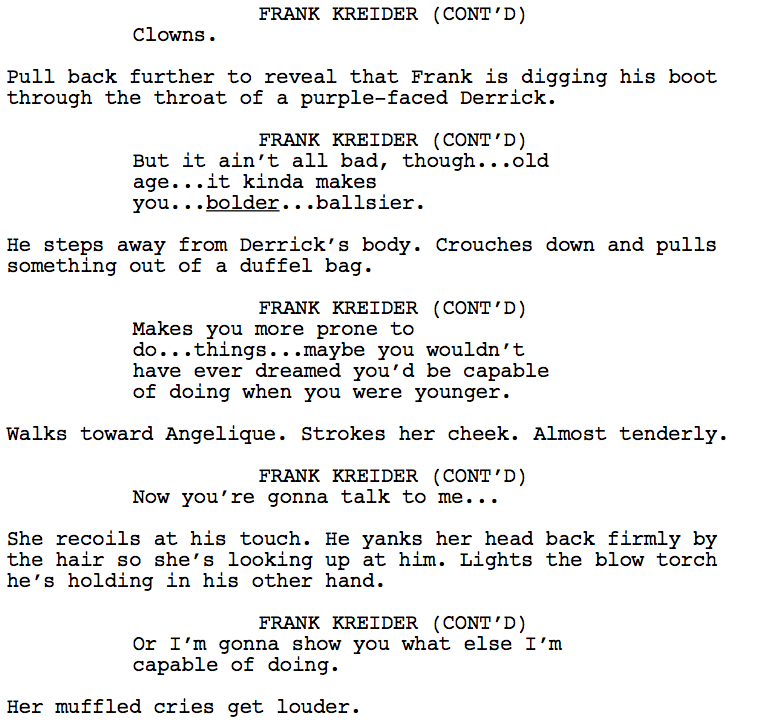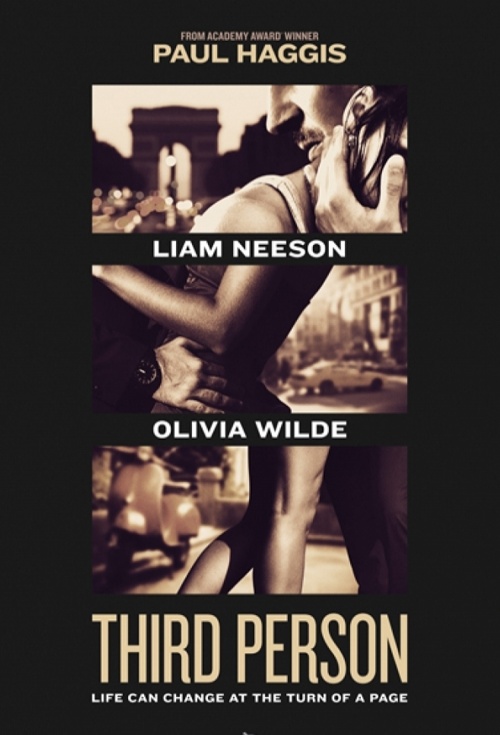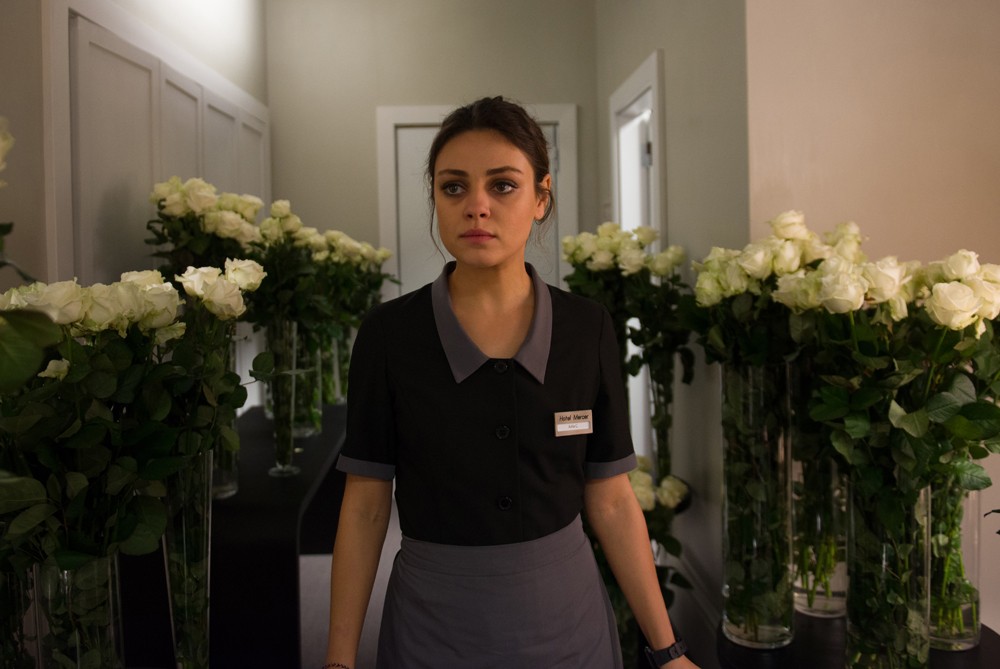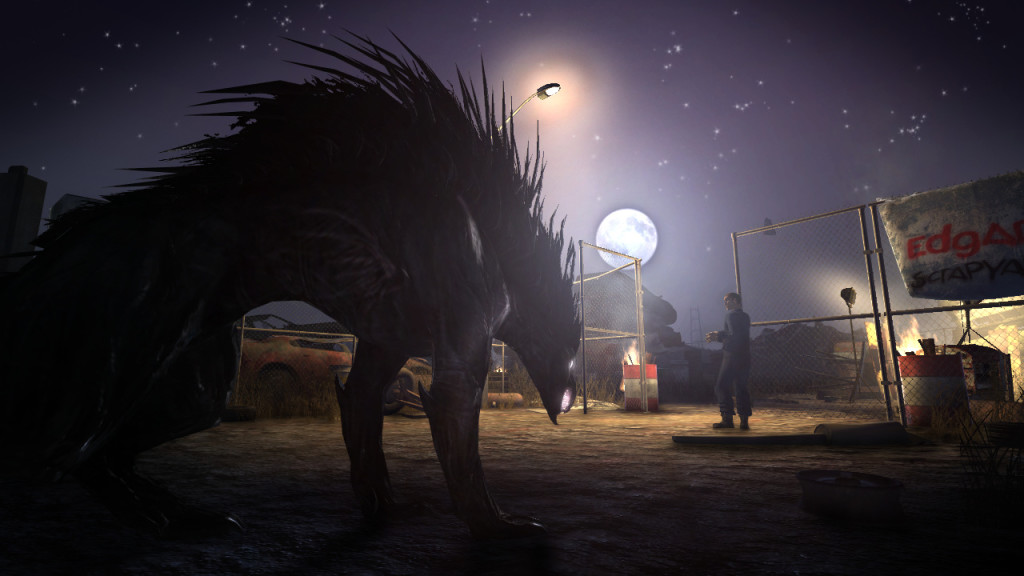Carson here. Been feeling lousy all week, therefore I am, sadly, going to take a sick day today. Luckily I still have something to post. The other day when I was talking about the age-old screenwriting question of which kind of script you should write (something personal or something commercial), commenter Tom gave the best answer to the question I think I’ve ever seen. So I’m re-publishing the comment below. — I like the idea of rewarding good comments so I’m thinking of making this a possible monthly thing. Publish the 3-5 best comments of the month. Thoughts?
From Commenter Tom:
The question of “commercial vs. personal” is not black and white. There’s a Goldilocks zone to it, and it’s one that some writers never reach. Ultimately, there’s an artistic side to your brain and a mathematical side to your brain, and unless you have unbridled raw talent, you have to find a way to get Pappa Bear and Mama Bear to play together.
I see a common progression in amateur writers.
1. The Sum Is GREATER than the Parts
Many writers start out with personal, artistic projects. Stories about their life experiences, or their high school friends, or some small article they read that sparked their imagination. And the scripts? Unreadable. The dialogue is stilted, the scenes are cliche, the conflict and pacing is scattershot. These scripts suck. But there’s an undeniable heart at the core of them. Although the individual components suck ass, there’s a purity to the overall story. But no one can bare to read more than 10 pages.
The writer then retreats. He/she reads other scripts, modeling the voices of those writers. They buy copies of Save The Cat and Story. They follow the industry and see what kind of scripts are selling, modeling their next effort on some of the trends. They log line, beat sheet, and outline. The result is:
2. The Sum Is LESS than the Parts.
Welcome to 95% of the Amateur Friday entries. Each individual scene is adequate, perhaps even exemplary. Dialogue is clean. Characters have flaws. Act I turning point hits exactly on page 25. The lead is a 35 year old male who has a mentor, a love interest, and a cat that he saves on page 4. The concept, while not “blow your mind” is solid. Yet, these scripts are… soulless. It’s all calculation. Commercial, yes. But forgettable.
A lot of writers never leave this stage. They marvel at how easily their early scripts flowed, and they can’t seem to replicate that old creative vision. Every time they start setting a script in an early period, or with a female lead they block themselves. These writers, while not hitting home runs, get a few singles or doubles. They get repped by baby managers who have them submit 10 log lines a week to determine their next project. They get stuck in this mathematical, calculating style of writing. Their projects never gain traction.
But after some time in this zone, a few finally say “Fuck it. I’m going to write what I want.”
3. The Goldilocks Zone
These are the writers who finally get noticed. The commercial side of their brain is no longer boxing out the creative side. The stories are personal, but with a larger, worldly-accessible twist. The story flows naturally, and yet subconsciously matches up with the 3-act structure.
The time spent in Zone 2 was invaluable because now they know and understand structure. They know how to bottle Blake Snyder and put him on a shelf, away from the process, but always ready to help. They can step back and see their story not as disassociated gears on a clock, but as a full living organism.
And the real key is they LIKE the stories they’re writing.
The Zone 1 scripts were hard to read. The Zone 2 scripts were hard to write. But these Goldilocks scripts are fun. And as a result, the writer’s voice begins to seep into the pages.
That’s the balance all writers have to find. You MUST know structure. You MUST know what’s commercial. You MUST be able to forget it all.
Genre: Drama
Premise: An intensely angry woman in a chronic pain support group starts looking into another member’s suicide while not really trying to put her life back together.
About: This finished on last year’s Black List and is currently in post-production with Jennifer Aniston and Anna Kendrick starring. In a testament to the value of hard work and perseverance, the writer, Patrick Tobin, has been writing for over 30 years, graduating from USC film school almost 25 years ago! This is his first big breakthrough success. The script has led him to another job adapting the Pulitzer-prize winning novel, “A Visit From the Goon Squad.”
Writer: Patrick Tobin
Details: 106 pages
Thank you to the Dragon Gods of Screenplay Heaven for an easy screenplay to read! Been waiting for a script like this for awhile. One that was minimalist but STILL contained depth! I hereby implore all of you, Scriptshadow Readers, to find this script and read it (it’s in the 2013 Black List folder, which everyone on my mailing list should have). This script embodies the spirit of the original Black List. Unknown writer taking a chance, writing something different and non-commercial, and getting recognition for it.
We’re on day 2 of the “passion v. commercialism” argument. And if these last two scripts are any indication, passion is winning! Ah, but that doesn’t mean you can write about your boring everyday life and get away with it. You gotta have skillz! You need to know how to burn this kind of joint before you can smoke it. Which I’m going to get to. But first, let’s take a bite of this delicious cake.
Cake is about 30-something Claire. We meet Claire in a Chronic Pain support group, where she’s sporting some scars on her face and neck. Clearly, she’s been in some sort of bad accident. But it isn’t just Claire’s body that’s hurting. Yup, you guessed it. It’s her soul, too.
A former attorney, Claire probably wasn’t the nicest person to begin with. But this accident – whatever happened – has turned her downright nasty. She’s almost excited to share with the group, for example, that their recent group member’s suicide (which involved a woman jumping off a bridge onto a cargo ship) ended with the gooey remains being shipped back to her husband in a Rubbermaid Cooler.
The suicide in question is a young woman named Nina. Claire envies Nina because she had the guts to get out. And while she’s not sure yet if she wants the same, she becomes infatuated with Nina’s decision, and by association, her life. This eventually leads her to Roy, Nina’s angry husband (lots of angry people here). It’s refreshing meeting someone with so much anger though, so the two begin a dysfunctional relationship based on pretty much anything but love and happiness.
(spoiler) It’s here where we finally get a window into Claire’s past. That car accident she was in killed her son. And when that loss turned her into the monster she is now, it lost her her husband too. Ironically enough, Roy has a son of his own. And maybe, just maybe, through spending time with them, Claire can find a way back to happiness.
This was fun!
I bet you’re confused upon hearing that, seeing as that synopsis is pretty depressing. But this is the thing about “Cake.” Claire is really funny! This is something a lot of you writers want to take note of. The great thing about writing someone at the bottom – someone who has nothing to lose and who doesn’t give a shit – is that they can say anything!
Real people are the opposite of that. We’re all giant liars. When we’re feeling bad and someone asks us how we’re doing, we fake a smile and say “Good!” When we have issues with a friend, instead of rocking the boat, we bury our frustrations and pretend everything’s great. Claire doesn’t do that. When you say, how are you, she says, with as much sarcasm as she can possibly muster, fucking dandy, before she shoots you a bitch smile and walks off.
Watching someone so untamed for 106 pages was refreshing. Now it’s a balancing act, because having an unlikable protagonist can backfire, but the thing about Claire was you understood why she was upset. She’s living through hell.
Also, there’s a huge difference between being unlikable fun and being unlikable boring. If Claire just kept to herself the whole time and was super duper depressed and barely said anything, we would’ve hated her. The fact that she’s so sarcastic and hilariously mean to everyone makes her fun to watch.
Recently, somebody asked me about the “slow build.” How do you do it? Cake is a nice template because you really don’t have much of a story here. Claire’s “goal” is to learn about Nina, but it’s a fairly loose thread.
When you’re building stuff up slowly, it’s important to set up mysteries (or you can call them “questions”). Mysteries allow you to move through your story slowly because the reader will still want to find out the answers to the mysteries.
Here, for example, we see those scars on Claire’s face and neck. We want to know what caused them. Claire wants to know why Nina killed herself. We do as well. Claire and her ex-husband have a bizarre relationship. We want to understand it.
Tobin keeps setting these little mysteries up, and they string us along. Combined with a fascinating character who’s acting the complete opposite of how normal human beings act, and it’s pretty easy to see why this is so readable.
Another thing that was nice to see was (spoiler) there was no super-deep melodramatic monologue moment. Usually when you have a script with a dying child like this, particularly one where the main character played a part in the kid’s death, you get the obligatory scene where they monologue their memories of the event, which ends in them crying and saying something to the effect of how they now know it wasn’t their fault.
It’s not that you don’t want highly emotional moments. But you don’t want anything obligatory about your script. Particularly if you’re not writing a mainstream movie. I mean, if you’re going to write something personal, it better be fucking unique. So say it with me everyone: Obligatory is a bad word. Bad obligatory!
Another reason this really worked for me is that with these protagonists that hate the world, there’s an inherent need to see them change. We want to see Claire find happiness again. We want her to overcome her boy’s death and her physical pain and want to live again and, frankly, not be so mean to everyone.
But this ONLY works if you’re truthful with the character. You have to be real. You can’t candy-coat the character and give them some artificial likable quality so we like them. You have to be honest and make her really mean.
Unfortunately, this comes with its own share of risks. People might end up hating your character if you don’t make them just right. I liked Claire because she was real, she was funny, and I understood why she was angry. But for other readers, it might be too much. They might not be able to excuse those qualities in anyone.
And also, these movies never make a lot of money. They’re always going to cater to niche cinephile audiences unless every single aspect of the production hits it out of the park, which is rare. So know that when you write these movies, you’re writing to an indie audience, which makes them a lot harder to sell.
With that said, this was a wonderful little script that totally surprised me. I love Patrick Tobin’s writing style and his unique voice. I’m actually shocked it took him this long to break through. Now let’s just hope the movie’s good!
[ ] what the hell did I just read?
[ ] wasn’t for me
[ ] worth the read
[x] impressive
[ ] genius
Number of times I checked the internet during read: only once!
What I learned: If you’re going to make your main character “unlikable” in the form of them being an asshole or a bitch, just make sure it’s motivated. Nina is a bitch because she lost everything. She lost her son. She lost her marriage. She lost her looks. She’s angry at the world for a reason, so we understand it. If she’s a bitch “just because,” the reader’s going to hate her.
Genre: TV Pilot – Drama
Premise: A former cop who’s lost custody of his son to a vindictive ex-wife, moves back home to plot how to get him back. In the process, he meets some old friends on the wrong side of the law, friends who may be the only people who can help him.
About: Okay, I’m super confused here. I read on Deadline that Badlands was a show that showrunner Shawn Ryan (The Shield) was doing for HBO. It covered a mining town in Wyoming. But this pilot, which was labeled as “HBO – Badlands” in the document title, is not about mining at all (thank God). So I’m guessing this is a completely separate pilot named “Badlands” that someone erroneously thought was the HBO pilot? Or Deadline was just way off? Either way, the writer, Joe Nienalt, has a short but sweet interview over at “The Boring Stuff” blog about the difficulties of being an “almost there” screenwriter. UPDATE: Okay, I got some new info here. Joe is NOT from Australia. The guy who interviewed him was. Joe is from Philly. Also, this is not the HBO Badlands. But, this pilot did get Joe invited to submit to the Sundance TV Lab (you have to have someone vouch for you to submit). I know Sundance really helps people get their stuff made, so maybe you can ask Joe about that process in the comments. — Also, I changed the dialogue sample. I knew it wasn’t the perfect sample but I’m still learning this screen grab thing (I can’t scroll and capture long scenes. I can only capture what’s on the physical screen, which limits me). Hope it’s a better representation.
Writer: Joe Nienalt
Details: 62 pages
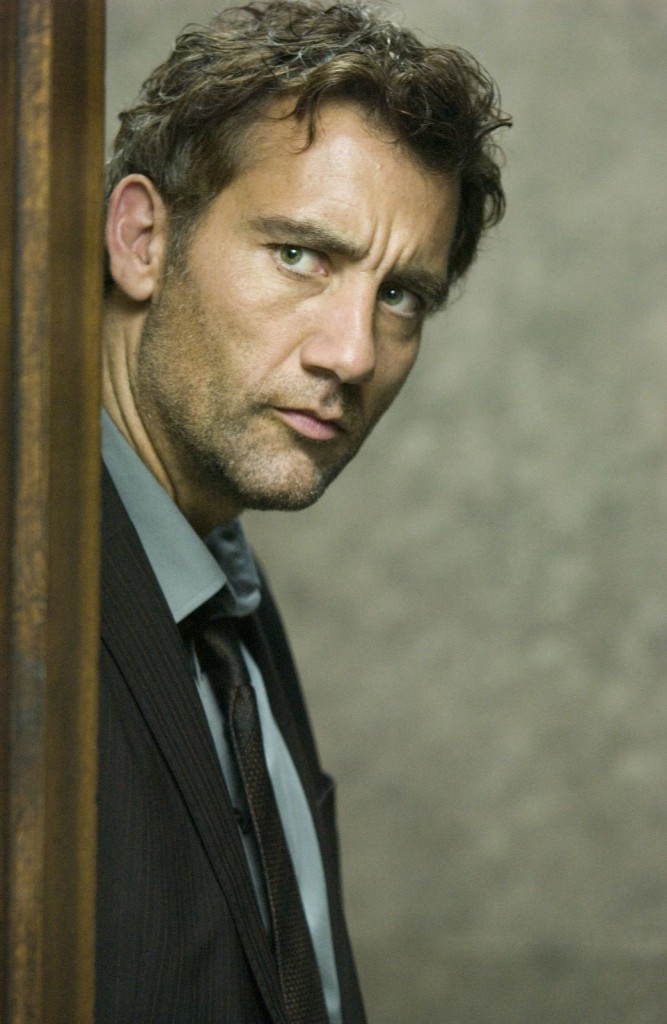 I wouldn’t mind seeing Clive Owen take on a TV role.
I wouldn’t mind seeing Clive Owen take on a TV role.
So I was reading the interview I linked above for today’s writer when I came upon something he said that happens to be one of the most debated topics in screenwriting. Joe said that when he stopped worrying about what was marketable and what Hollywood wanted and focused more on himself and what he cared about, that’s when Hollywood noticed him.
Writers can go crazy overthinking this, and I’ve gone back and forth on it over the years. Then recently, something occurred to me that I hadn’t thought of before: timing. Writers break through when they’re ready – when their mastery of the craft gets to the point where they can write good screenplays. Therefore, whatever genre they’re writing at that time (a big action movie or a small personal drama) becomes the one that breaks them in.
The writer then says to himself, “I broke in with an action movie so Hollywood is about being commercial,” or “I broke in with a personal script so Hollywood is about being true to yourself,” and then they ride that mantra along for the rest of their career, believing it’s the only way. That can be misleading because maybe you’d just gotten good enough that whatever you wrote next was going to be the one.
Because the thing is, you can take either of these approaches too far. If you think it’s all about being true to yourself and ignoring the commercial aspect of the industry, you can write something that’s so innocuous, nobody gives a crap. And if you think it’s all about giving them vampires and robots wrapped inside a catchy hook, you can write something so vapid that nobody gives a crap.
So I love reading scripts from writers who have declared themselves believers of one way over the other, as I feel that each of these scripts gets me one step closer to finding the definitive answer.
Now I originally thought this pilot was about mining, and boy did I wonder how the hell someone was going to make that interesting. The subject matter isn’t quite that boring, but it was lacking a hook. So let’s see if Joe was still able to make it entertaining.
30-something Joseph “Buddy” Shields, a former cop, happened to marry the wrong woman. Like a really terrible woman. And that woman, who’s now his ex, is raping him of everything he has, including his home, and most importantly, his son. The ruling is so bad that not only does Buddy have to leave his home, but he still has to pay the mortgage while his ex-wife lives there. His reward? Seeing his kid once every other weekend.
That isn’t enough for Buddy. His kid means everything to him and he’s willing to fight to get him back. The problem is, he doesn’t have any money for a good lawyer, and lawyers are the people who get your kids back in these wars.
Broke, Buddy is forced to head back home to Philadelphia and live in his mother’s house. His old neighborhood, Badlands, is the worst in the city, and we quickly realize Buddy was one of the few to escape and actually do something with his life.
Now that he’s back, all those “bad influence” friends start visiting him again, including his old buddy “Fast,” who’s become a bit of a criminal in his middle-age. Fast sees how badly Buddy wants his kid back and offers him a deal. Join him, run some “jobs,” and he’ll be able to afford any lawyer he wants.
Buddy doesn’t think twice. His kid is everything to him. If he has to lie, cheat, and steal to get him back, that’s what he’s going to do. But when Buddy realizes that some of these jobs entail killing some of his old friends, he realizes just how deep this rabbit hole goes. But in the end he feels that if his son is at the bottom of that rabbit hole, then fuck it, he’s willing to dig.
I got to give it to Nienalt. This was really good writing. I know something’s good when a) I’m involved even without a story hook, and b) when the writer can make things I’ve already seen before interesting.
That’s the biggest shock of Badlands, is that we’ve seen all this before. I’ve seen the divorcee desperately trying to get visitation. I’ve seen the middle-age protagonist who has to go back to his hometown to regroup. I’ve seen the hero who, once back home, is pulled into a crime ring.
But what makes Nienalt different is he addresses all of this in such detail. I think this is what he meant when he said (in his interview) that he became a better writer once he looked inward, because he states in that interview that he got a divorce, and we see all that pain and those unfair custody hearing details right there on the page. I’ve never had to fight for custody before, but if I had to guess, it would be something like this.
And when you add details, when you add REALITY to your script, the reader REALLY begins to trust your story. They know this isn’t something somebody slapped together in a month, but rather the blood, sweat and tears of someone who’s been through these things. And that gets to you. Because you know the writer really suffered. And it draws you towards the protagonist in a way that you wouldn’t have otherwise.
Now as far as the criminal stuff – like when they robbed a marijuana store – I don’t know how he pulled that off. I hope Joe isn’t doing that in his spare time. But man, he knows this Badlands town so well that if you told me tomorrow Joe had been in prison for robbery, I’d probably believe it.
And you can really tell when someone knows an area when the dialogue feels authentic to that area. Usually, when I see writers trying to write low-income criminal type dialogue, its wrapped inside this upper middle-class entitlement sheen, the way some middle class kid THINKS people like that talk because they’ve watched a lot of movies. You can always tell the difference when a writer has a true ear for this stuff.
The only real issue I had with the pilot was the longevity question. As you well know, the one big difference with a TV pilot is you have to be able to see 50-100 more episodes going forward. With the only real goal in this setup being for Buddy to get his kid back, I’m not sure where the story goes afterwards.
There is (spoiler) a scene at the end that reveals Fast is a cop, and he brings Buddy in as a Badlands cop too, which was a nice little twist. But I’m not sure what that means. Does that mean we’re going the basic “corrupt cop” route that we’ve already seen before? Does it mean these guys are going to pull a bunch of heists/robberies as cops? I feel like these are trails already well-traveled so it’s hard for me to envision the future of the show.
The thing is, Nienalt is so good at making “been there, done that” scenarios feel authentic and fresh, that he might be able to make it work. If not for this show then for something else. I really like this guy and will be watching him a lot closer after this.
[ ] what the hell did I just read?
[ ] wasn’t for me
[xx] worth the read
[ ] impressive
[ ] genius
What I learned: You’d like to include things in your script that you can talk about with some level of expertise, whether it’s a job or an experience or something from your personal life. The more expertise you have, the more detailed and, therefore, authentic your story will be. I loved how Nienalt included these custody hearing details. It made me sympathize with the protagonist in a way I wouldn’t have if the execution of that stuff was more generic. Remember, the reader can always tell when you’re bullshitting them – when you don’t know any more than they do about something.
Genre: Drama
Premise: Follows a group of characters, with the focus on a writer trying to finish his latest novel in the midst of a complicated affair.
About: This is Paul Haggis’s latest writing-directing effort. Haggis’s film, Crash, won the Best Picture Oscar in 2004. Haggis has gone back and forth between big projects and personal projects since. His personal projects haven’t really broken out, but his big projects have done just fine (Million Dollar Baby, Casino Royale, Quantum of Solace). Haggis was known even before Crash as one of the better writers in town, so his scripts are almost always good reads. Third Person comes out this month (June 20th) and has a stellar cast that includes James Franco, Mila Kunis, Olivia Wilde, Liam Neeson, Maria Bello and Adrien Brody. It should be noted that this is an older draft and that Haggis has probably worked on it since.
Writer: Paul Haggis
Details: 121 pages – May 24, 2011 draft
Man, just a week after I told everyone to beware of The Wall of Text, I see it on the FIRST PAGE of Third Person! BUT before all of you go hollering at me (“See Carson! There are no rules!”) we should note that Haggis is also the director of this script, and therefore the rules don’t apply. Without having to get his script past readers, he doesn’t need to keep their attention the same way you, the unknown do.
It was rather strange to see though, as the last couple of Haggis scripts I read were quite sparse. Maybe this was an early draft where Haggis was still exploring things and therefore unafraid to ramble? I don’t know. But after you get past the opening Text Wall, things start moving along a lot faster, and Third Person becomes one of the better scripts I’ve read this year.
I have a new gauge for determining screenplay quality: How many times I check the internet while reading! With Third Person, I only checked TWICE! For the average Amateur script, I probably check it at least 30 times. Maybe I’ll add the “internet check gauge” at the end of every review now. We’ll see.
Third Person follows a group of seemingly random characters. There’s 50-something Michael, a married writer who’s rented out a hotel room in London to finish his latest novel. There’s 20-something Anna, an aspiring writer who’s having an affair with Michael. She’s flown to London so Michael can read her latest short story (which she hopes to get published), with ‘fooling around’ also on the docket.
There’s 40-something Sean, a middle-income married businessman in Italy. He meets a beautiful but troubled local, Monica, who’s in desperate need of money to buy her daughter back from some bad men.
Finally, there’s Julia, an extremely attractive woman who’s had a huge fall from grace. Once married with a son, she went crazy and almost tried to kill him. She risks never seeing her son again if she can’t convince a court-appointed therapist that she’s sane.
The main story is Michael and Anna. Despite it being the most boring plot on paper, the relationship between the two is captivating. Both of these characters have trouble loving, and they push and pull at each other in such a depraved manner that you’re constantly wondering what the hell’s going to happen to them. Both characters have power over the other (him, his job, her, her sexuality) and use that power at every turn.
The Sean storyline is a weird one. Sean meets this Monica girl at a bar in Italy. She “accidentally” leaves her bag there. He finds her to return it, which is when he learns she’s trying to save her daughter and needs money to do it. Sean’s not sure if he’s being conned, but he gets the money for her anyway because he wants to believe in her, because he wants to believe in a just world. What happens next are a thousand twists and turns as we, like Sean, wonder if this woman is legit or not.
Julia’s story is the least interesting, as we’re not given enough information up front to understand why this therapist meeting is so important to her. Therefore, everything leading up to that appointment is fairly boring, as her scenes are relegated to cleaning hotel rooms at the hotel she just started working at.
I’d give Third Person an “impressive” through the first 100 pages. Michael and Anna’s relationship in particular was a blast to read. Not only was there the unpredictability of the relationship itself, but both characters were putting important writing works into the world, and the suspense of how those works were going to be received (Michael, by his publisher, and Anna, by Michael) kept me engaged. True, my love of writing played a part in that, but even without it, this was one of the better relationships I’ve read on the page in awhile. The only way I can describe it is pure… ENERGY.
Indeed, the unpredictability of those two bled into the rest of the script. Haggis is so far ahead of you as you try to predict where this will go, that after awhile you shake your head and give in. It’s what every great writer does. With whatever element you’re writing (story, character, scene), figure out what the audience’s expectation is, then use that against them. Haggis does that again and again and again here.
Where Third Person gets weird is in its final act. I don’t know if Haggis was trying to outthink himself or what, but let’s just say it begins with a HUGE F*CKING SHOCK. Something we didn’t see coming at all. I actually had to go back and re-read earlier parts of the script just to confirm that what I read was what I read (I’m sorry I can’t reveal it here – it’s too huge of a spoiler).
Personally, I don’t think Haggis set up that twist well enough for us to buy it. But it’s what happens afterwards that throws us for a loop. As the plotlines start to intersect, either they don’t intersect clearly or I completely missed some earlier setup, because all of a sudden Julia (the child-hurter) is calling Michael’s wife and I had no idea these two even knew each other. It was so out-of-left-field, I started to wonder if Julia and Anna were the same person.
Part of my reasoning was that Michael’s novel was supposedly about characters who didn’t know they were in a book (a throwaway line early on). But that didn’t explain how characters could’ve been the same people.
The thing is, the first 100 pages are so good, you almost forgive this confusion and believe it’s your fault (maybe it was?). And in the end, when I put Third Person down, I immediately wanted to discuss it with someone to figure this stuff out. That’s a good sign. Because I’ve read plenty of confusing scripts where the only thing I wanted to do afterwards was press delete.
The bigger picture here is that Third Person is a dying genre. This is a straight drama where nobody shoots anybody. Kramer vs. Kramer kind of stuff. They don’t make these movies anymore. Hollywood has a new name for them. They call them “execution dependent,” and saying those words in a studio office is the equivalent of telling the executive that you banged his wife last night. In fact, he’d probably be happier if you banged his wife.
Indeed, if these dramas are executed well, they’re awesome. But if they’re not, they can lose 50 million easy. And for what? Maybe 40 million upside? No studio wants to take that chance. They’d rather make a monster/alien movie that, whether it’s executed well or not, they can slap together a snazzy trailer for and get people to show up.
There are a few people left making these movies and Paul Haggis is one of them. Thank God for that because we need variety in the marketplace.
[ ] what the hell did I just read?
[ ] wasn’t for me
[xx] worth the read
[ ] impressive
[ ] genius
Number of times I checked Internet during read: 2 times
What I learned: If you’re writing a straight drama (no cops or spies), you have to make the audience talk afterwards. That’s the only way you have a shot. You don’t have explosions or special effects to bring people in the traditional way. So you need word of mouth. Haggis does that two ways here. First, there’s that huge shocking twist on page 100 that I can’t spoil (sorry!). And second, the last 20 pages are open to interpretation, which should get people trading ideas afterwards. In other words, when you’re writing these, think about movies like “The Crying Game.”
Get Your Script Reviewed On Scriptshadow!: To submit your script for an Amateur Review, send in a PDF of your script, along with the title, genre, logline, and finally, something interesting about yourself and/or your script that you’d like us to post along with the script if reviewed. Use my submission address please: Carsonreeves3@gmail.com. Remember that your script will be posted. If you’re nervous about the effects of a bad review, feel free to use an alias name and/or title. It’s a good idea to resubmit every couple of weeks so your submission stays near the top.
Genre: Horror
Premise (from writer): After survivors of a recent hurricane relocate to a quiet Louisiana bayou town, a creature goes on a nightly rampage of terror and carnage. Convinced it is the legendary werewolf known as loup garou, an intrepid teen vows to discover the beast’s true identity and destroy it.
Why You Should Read (from writer): This script is my take on the classic monster movie. The story moves quickly, is filled with colorful characters and contains a truly badass werewolf. It’s placed well in a couple smaller contests and now I want to see how it fares in the AOW thunderdome.
Writer: S.D.
Details: 93 pages
It only seems appropriate that a script about a mysterious werewolf is written by a mysterious writer. Known to us only as “S.D.” the Primal scribe has thrown his hat into the Amateur Offerings arena.
Mysterious or not, S.D. has a tall order ahead of him. Of all the monsters out there, I think werewolves are one of the weakest. My issue with them is that they’re basically glorified wolves, and the rules that govern them aren’t as clean as some of the other monsters. For example, we know vampires need blood to survive. We know zombies need human flesh to survive. What do werewolves need? Why do they kill? That’s something I thought a lot about during Primal.
Say you’re a guy who turns into a werewolf. If you move into an area and start killing everyone in sight, you’re probably going to have to move out fairly quickly, which is logistically inconvenient – having to move from residence to residence every week or so. Now if you HAVE to kill? If killing is something you have no control over? That’s another issue.
But that was my problem. I never knew why the werewolf was killing. I don’t know if werewolf fans care about this stuff. But as a storyteller, I think it’s in every writer’s best interest to know all of the rules governing their universe and convey those to the reader clearly. Especially since S.D. appears to be breaking away from werewolf lore (his werewolves don’t need a full moon to turn). With that in mind, let’s check out Primal.
18 year-old Chris Durance works as an assistant manager in a New Orleans trailer park, where he also lives with his father. Things seem to be going well until two new sets of tenants move in. First, there’s the easily agitated James Hettis, and then the father-daughter duo of Remy and Annie. Lucky for Chris, Annie is a little beauty queen in the making, and she seems to have the hots for him.
Soon after that, the killings begin. There’s a hunter, an old codger, and even Chris’s own father! It’s serious enough that a Monsters-are-real blogger type, Tobin Fromski, shows up and starts documenting the killings. The thing is, nobody really believes that something supernatural is at work here. It’s gotta be some angry bear or something, right?
But as the evidence continues to mount, all signs point to some French version of the werewolf, which is like, the worst kind of werewolf there is. This guy doesn’t even need a full moon to turn. He does it whenever he wants!
The rest of the script is about everyone (including us) trying to figure out who the damn werewolf is. Is it the mysterious drifter who’s always hanging around just outside of town? Is it the intensely private new tenant James Hettis? Or is it some outside presence they haven’t met yet? Download the Primal script below to find out.
Primal was so easy to read! This script slides down your throat like a tall glass of milk. The paragraphs are short and to the point. The writing glides along from word to word. And it’s a pint-sized 93 pages.
Now there’s some debate about whether that’s a good thing or not. The argument being, how can you move someone on a deeper level if everything’s so short and simple? In the end, that’s a choice you make as a writer. Not every script is going to be Casablanca. Not every plot needs to be as complicated as Citizen Kane. So when you’re talking about a “monster in a box” werewolf script, simple is probably the best way to go.
With that said, the lack of complexity did affect my enjoyment of the story. Despite how well this was written, I knew who the killer was almost immediately. (spoilers) The other suspects (the drifter, James Hettis, and Annie’s dad) were so outlandishly bad that it would’ve been too obvious if they were the werewolf. That left one person – Annie.
The thing is, I believe Annie was the right choice to be the werewolf. S.D. just needed to cover his tracks better. This is essentially a murder mystery. And with any murder mystery, your job as the writer is to keep fucking with the reader. Every person we meet has to be presented along with the tiniest clue that THEY could be the killer (or werewolf in this case).
So everyone Chris investigates – whether it be old man Swagger, Deputy Munro, or even Chris’s own father – has to make us reevaluate what we think we know. I mean Chris’s father just came back from some long job, right? Maybe he caught something out there.
From there, whoever your killer is, you have to give us one scene that DEFINITELY RULES THEM OUT, so that we never consider them as a possibility. So for example, Chris should be with Annie when one of the killings occurs. That way we don’t even consider her and when she turns out to be the killer, we’re truly shocked. How you explain that other murder will be tough, but that’s what a writer’s job is. To come up with creative solutions to tough problems (they did it in Scream by creating dual-murderers).
Character-wise, I think S.D. suffocated the script with too many characters for a 90 page screenplay. On my count there were 18-20 characters, which is way too many for something as simple as this. With all those characters, you weren’t able to get in depth enough with the characters that mattered.
I mean I barely knew Annie. She had, what? 3-4 scenes with Chris before she’s devastated to hear that he’s leaving with his father? If you cut out some of those other characters, you could up that to 7-8 scenes, and then it feels a lot more realistic when she’s upset. I know when that scene came I was like, “What?? You barely know this dude.” I mean we have two deputies here. Do we need two? We have Sam Washington. Who the hell is Sam Washington?
Likewise, use that extra space to beef up the depth of ALL the key characters. I liked how S.D. built up Wes’s (Chris’s dad) backstory, how he lost his wife and had turned to drinking. But I barely knew anything about Tobin, the blogger, who probably gets more time than anyone. And come to think about it, I barely knew anything about Chris, too. And he’s your hero!
Outside of that, the script felt a little small. I don’t know if there was enough of a twist here to get people excited about this as a film. There’s the trailer park angle, which was different, but is it different enough? These movies can certainly get made because the setup is so easy to convey. But to REALLY get a producer excited, you need something fresh.
I mean there’s all this talk about this being a special kind of werewolf, but the only thing different about it was that it could change whenever it wanted. If you could expand the mythology of the werewolf and add some new twists to it, maybe this starts to feel fresher. I wish I could give some suggestions but, again, werewolves aren’t really my cup of tea.
Like a lot of people who win the Amateur Friday slot, S.D. is definitely a good writer. In addition to that, he’s writing movies that have a chance in the marketplace. But I think this is one or two complexity notches below what gets producers excited. Get rid of some characters, beef up the remaining ones, add a little more mythology to the werewolf, keep us guessing with the killer, and this script could eventually do some damage. I wish S.D. the best of luck!
Screenplay link: Primal
[ ] what the hell did I just read?
[x] wasn’t for me
[ ] worth the read
[ ] impressive
[ ] genius
What I learned: Remember that whatever vice your character has, there was a trigger for it. It might’ve happened recently or it might’ve happened a long time ago. Find that trigger, because it’s probably the thing that’ll most shape who your character is. So for Chris’s dad, he’s a drunk. The trigger for him drinking was his wife dying a year ago. That’s who he is in this story. He’s a man grieving. He’s a man who must get over the death of his wife.


